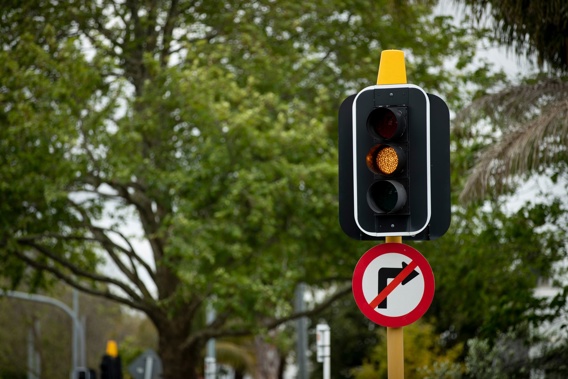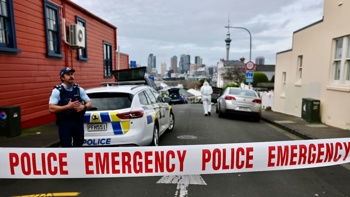
New Zealand will stay at the orange traffic light setting.
Health Minister Ayesha Verrall said the country needed to remain at this setting as Covid case numbers were starting to "creep up".
Today the government also made changes to reinfection advice. Anyone who experienced symptoms 29 days or longer after a previous infection must test and isolate if they return a positive result.
"Moving back to red is unnecessary at the moment. We can continue to manage the virus at orange, but are putting in place a range of additional measures to help manage a recent rise in cases," Verrall said.
But with hospitals under pressure from flu and Covid and numbers starting to creep up again a suite of additional measures were being put in place to help reduce spread, she said.
The government also announced 50 child-sized masks would be made available to every year 4-7 student in New Zealand.
An additional 20,000-30,000 masks a week would be provided to all other students and school staff. Extra funding would be made available to schools and early childhood services to support better ventilation over the winter months.
"Getting vaccinated is the number one thing New Zealanders can do to help relieve pressure on our health system this winter. We are seeing an overrepresentation of unvaccinated people in hospital admissions so we strongly urge everyone to make sure they are up to date with their vaccines.
"We are also updating our advice around reinfection and are now asking anyone experiencing Covid-19 symptoms 29 days or longer following their initial infection to test. Should they test positive they will need to isolate for 7 days.
"This is a change from earlier advice which was that people would not need to re-test if they had tested positive for Covid-19 within the past 90 days and is based on the latest international evidence and the need to isolate quickly people with reinfections.
"However household contacts who have had Covid-19 within 90 days won't need to isolate, unless they are symptomatic. There is clear updated advice on what they should do to reduce risks to themselves and others. "
Verrall said while reinfections were low at the moment they were likely to increase.
"The B.5 variant of Omicron is predicted to become the dominant strain in the country in the coming weeks and is a different variant to what most New Zealanders caught the first time around.
"With these measures, alongside additional support in schools and early childhood services, the Government is stepping up our response to help reduce the spread of Covid. We always said this was going to be a challenging winter and we need everyone to play their part to help us get through safely."
Meanwhile, there are 7423 new community cases of Covid-19 in New Zealand reported today.
The Ministry of Health reported a further 19 deaths of people with Covid-19
These deaths had occurred in the past seven days.
There are 411 cases in hospitals across the country, including six people receiving intensive care treatment.
Two people whose deaths were reported today were in their 50s, three were in their 60s, one was in their 70s, six were in their 80s and seven were aged over 90.
"This is a very sad time for whānau and friends and our thoughts and condolences are with them. Out of respect, we will be making no further comment on these deaths."
Two of these people were from Northland, three were from Auckland, three were from Waikato, one was from Bay of Plenty, one was from Hawke's Bay, two were from Wellington, one was from Nelson-Marlborough, four were from Canterbury and two people were from the Southern region.
The total number of report deaths with Covid-19 is now 1522. The seven day rolling average is 13.
Meanwhile, the seven-day rolling average of community cases is 6114.
The seven-day rolling average of community cases at the same time last week was 4817.
Yesterday there were 7829 new cases in the community and a further 15 deaths were reported.
There were 395 people in hospital with the virus, including eight in intensive care.
The seven-day rolling average of community cases was 5808. This is higher than the average last Wednesday of 4873.
The ministry said the increase was not unusual to see after a long weekend.
"It will take more time before we are able to determine if this is part of a trend."
This comes after a surge of cases earlier in the week and the dropping of vaccine mandates for border and Corrections staff.
Experts are saying that the start of a second Covid-19 wave will hit in the coming weeks - meanwhile, health practitioners are dealing with an influx of respiratory illnesses like the flu and colds.
University of Canterbury epidemiologist Professor Michael Plank said it was possible New Zealand was near the start of a second wave and reported case numbers could increase in the coming weeks.
"We're likely to see a significant increase in the number of cases, exactly how the severity of those cases will compare to the first wave is a bit uncertain, but just the increase in numbers will likely flow through to hospitalisations and deaths increasing as well."
Meanwhile, University of Otago epidemiologist Professor Michael Baker said it was "pretty likely" Covid-19 case numbers would increase and while many people were "completely over" the pandemic, it was still an ongoing threat.
"We can see in the numbers, by every indicator, it's a huge ongoing problem," Baker said.
"The indicators are the number of people in hospital, it's putting pressure on the hospital, and it's also taking some workers out of [work], it's putting pressure on the schools and now it's combining with influenza."
Border and Corrections workers will no longer be required to be fully vaccinated against Covid-19 with the mandate lifting on July 2, says the Government.
Verrall said vaccine mandates have been under continuous review and the plan was always to remove them when it was "safe to do so".
"Vaccination has been one of our strongest and most effective defences to protect against Covid-19. It's helped protect our border and Corrections workers and their whānau. But we feel the requirement has served its purpose well.
"The risk Covid-19 poses at the border is much lower than it was previously. Alongside high rates of vaccination amongst border workers, the number of passengers arriving by air with Covid-19 is less than 3 per cent."
Take your Radio, Podcasts and Music with you









